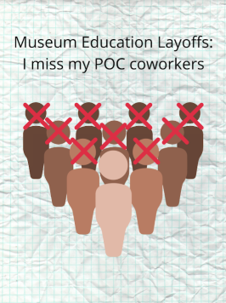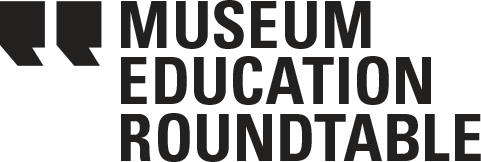#DearMuseums Week 4: Inequity
Are these times really that “unprecedented”? For too long, people of color have been disproportionately affected during crises. The power and privilege that is inherent in museum leadership must be used to center equity or we risk setting back the inclusive efforts within the field. These two entries–one image and one open letter– are powerful reminders of the inequity in our field.
Submission 1:

Submission 2: Museum educator Emily Turner granted us permission to use her name with this powerful letter. Minor edits were made for clarity.
It’s been long-apparent that the museum as a construct is an inherently violent institution that exists solely to reproduce itself. The foundational function – to take (collect), reclassify, and interpret – is a series of extractions and recontextualizations in which objects and stories are given new meaning and validity. In successfully bestowing significance onto the items in its care, the museum in turn validates itself and the collecting enterprise. The museum seeks to fulfill this role in perpetuity, and develops processes and practices to preserve its unique power and justify its continued existence.
The field at large is mostly concerned with access, diversity, inclusion, and equity work as a way to demonstrate that the museum cares, but not so much that the root of the enterprise is undone – to change the content but not the form. But the true goal of racial equity and decolonization work is to unravel it all and create something new. To commit to institutional transformation is to commit to changing the content, the form, the process, and the purpose of the museum so wholeheartedly that it becomes an active participant in the dismantling of all forms of oppression in its community at large. To do this requires a willingness to self-annihilate, to transform the museum into something unrecognizable. To destroy the museum and erect something more beautiful and healing in its place is a wonderful fantasy, but this fantasy relies on a similarly transformed world. Although the world has been inextricably altered and we are told the museum is in danger. This moment is not the new world we were hoping for, nor is it of our own creation.
Those with the power to decide how to preserve the museum in this moment certainly did not create the pandemic or its economic fallout, but they are distinctly responsible for shaping the circumstances that direct where its impacts are felt. In deciding what to cut and what to save in order for the institution to survive they are defining its heart, its enduring qualities, and those best fit to navigate it through the crisis. By and large what they are choosing to preserve is conveniently, themselves. The decades-long incremental process of transforming museums from purveyors of knowledge to community collaborators has been an attempt to shift the distribution of power within the museum. Were the fate of our institutions more firmly in the hands of those most committed to its transformation, we might be taking advantage of this moment to push a more equitable model of what the museum could be. However in most instances we are seeing a retreat back into what the museum was – the intellectual, extractive core – and an undoing of the power shift. We see this in institutions where entry-level and part-time staff are the first to go, where people of color fill the most precarious positions, where educators have no value without school children to interact with, where employment is inherently contingent, where work goes unpaid, and where those who direct the work are prioritized over those who do the work.
It’s hard to be hopeful or imaginative when death surrounds us and uncertainty permeates every aspect of our lives, but remember: it doesn’t have to be this way.
Call for Submissions:
We want to hear from you! Help us with next week’s #DearMuseums all about museums reopening. Learn more about submitting to #DearMuseums here.
Resources for further reading & support:
Equitable Institutional Sustainability in Times of Crisis
Museum Workers Speak Relief Fund

